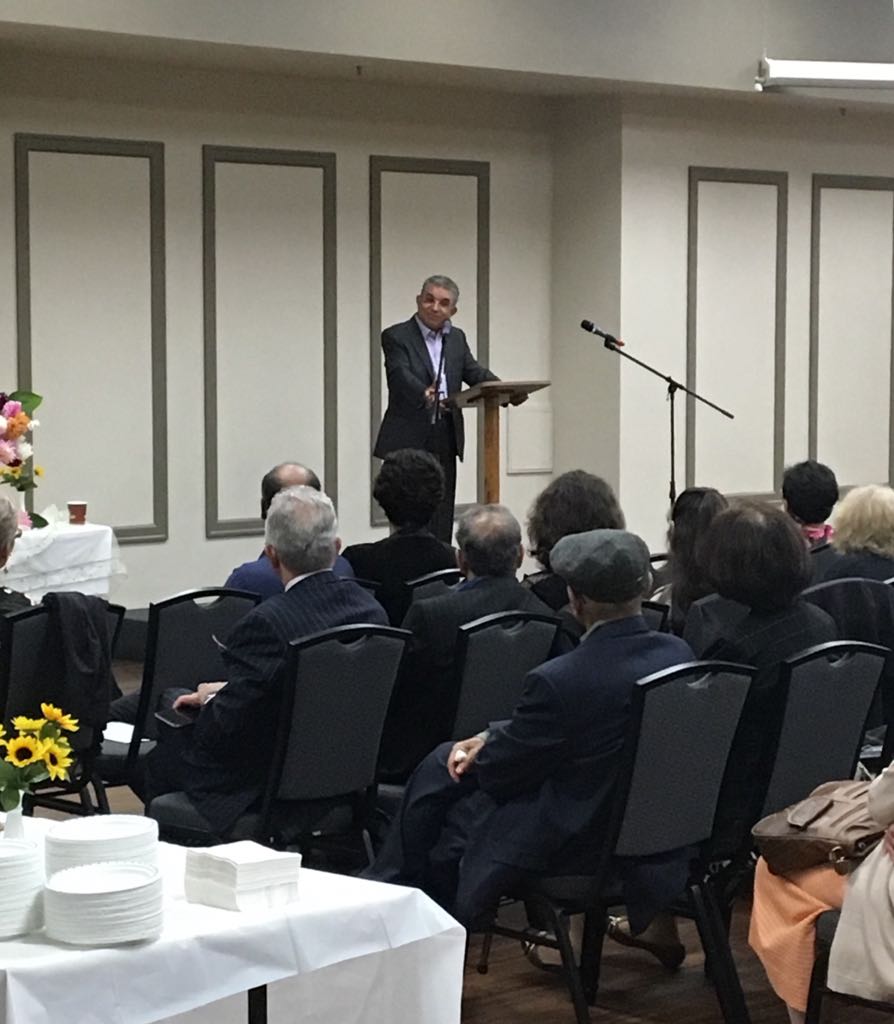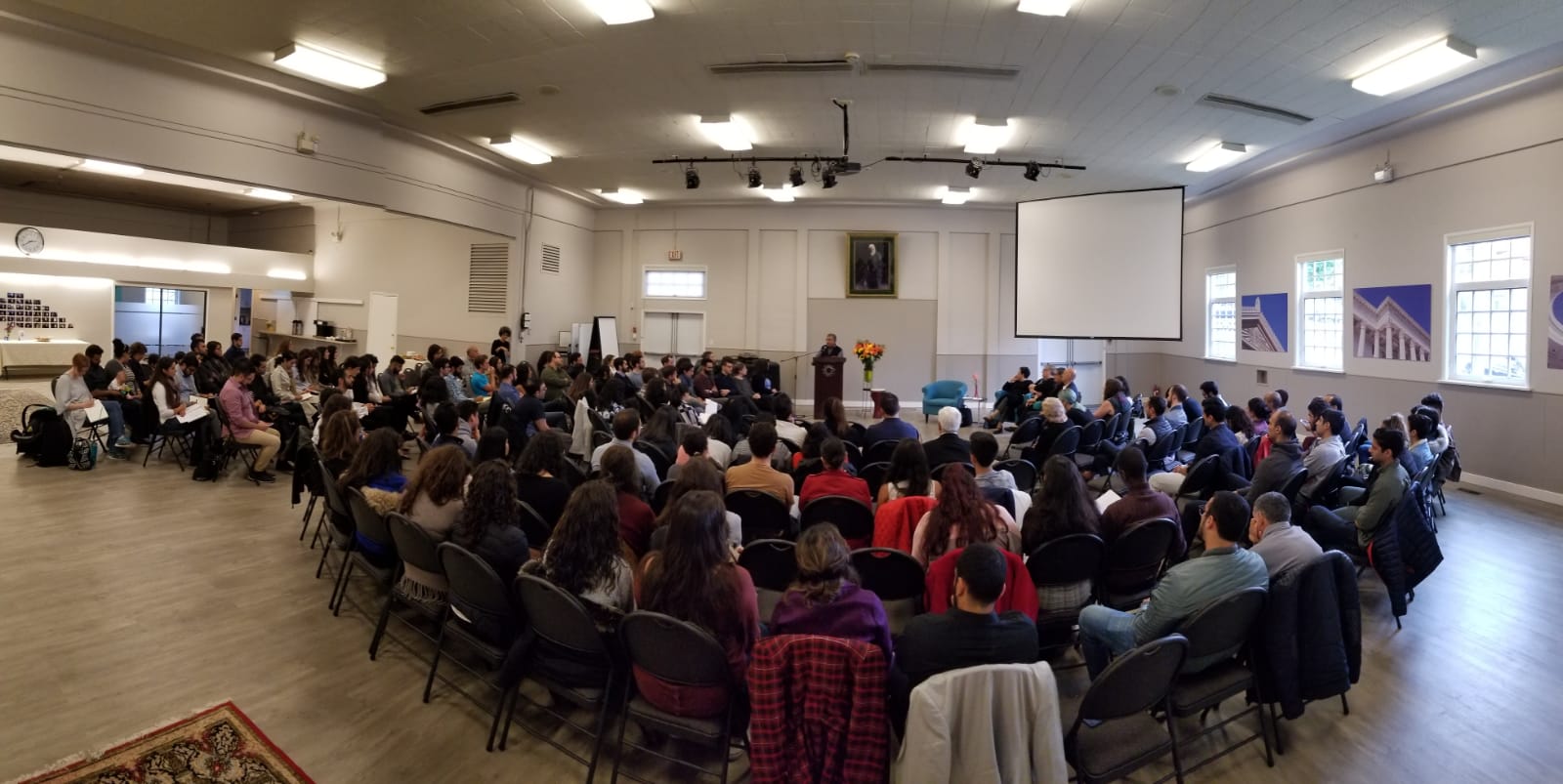Dr. Firaydoun Javaheri’s talks encourage love for the Universal House of Justice
Dr. Firaydoun Javaheri speaks to a crowded hall about love and obedience to the Universal House of Justice during his visits throughout the Yukon and British Columbia. Photo: Galen Humber
Galen Humber shares what he learned from listening to the talks of Dr. Firaydoun Javaheri, a former member of the Universal House of Justice, while he was visiting the friends in British Columbia.
Dr. Firaydoun Javaheri’s love for the Universal House of Justice was spread throughout the Yukon and British Columbia this past fall when he and his wife travelled through the Westcoast to meet with the Bahá’ís.
In B.C., they met with several different groups of friends across the lower mainland. They gathered with youth, young adults, Persian-speaking friends, and numerous meetings with smaller groups of friends in more intimate settings. In total, over a thousand people come together to hear Dr. Javaheri speak.
One of the common themes in his conversations was the importance of strengthening our love for the Universal House of Justice. He spoke about how this love is manifested through our obedience to the guidance and our continued efforts to study and understand what it is asking us to do. He said that each and every one of us has a role to play in this series of unfolding Plans at every stage of our lives.
In exploring the focus of the current series of Plans, he called to mind the potency of the Institute process for exposing hearts to the Word of God and the power that it unleashes as it transforms souls and engages them in action. Empowerment, he said, is the awakening of the desire to act on the Word of God, and to draw upon its power. He explained that while we have many ways of teaching the Faith and of deepening that have evolved over time, the institute process and its core activities is the instrument that the Universal House of Justice has provided us with to be able to work with large numbers in a systematic way, opening the way for entry by troops. Everyone has the obligation to understand it, support it and participate in it in any way feasible. This does not mean that individual teaching efforts, using other approaches of teaching, are not important as long as they are associated with capacity building and human resource development. It is critical that a spirit of inclusivity is spread in the community as every lover of the Blessed Beauty has a part to play in the implementation of the divine Plan.
One of the other themes that he spoke about was constructive resilience and things we can learn from the Bahá’ís in Iran. Through their example, he explained, we can learn about certitude in the Manifestation of God, sacrifice for the Manifestation, obedience to the laws of the nation without compromising principles and patiently championing justice. He spoke about the ways in which they have been able to avoid being drawn into the cycle of oppression through patient resilience as they continue to serve their fellow countrymen with love and humility without becoming angry or violent in the face of continued injustice and attacks on the community.
In the West, however, we are faced with a different kind of oppression: the forces of irreligion and gross materialism. We need to ensure that these forces do not cloud our purity of heart or motive, while also avoiding becoming caught up in excessive criticism or protests on this or that issue. Similar to the friends in Iran, a patient resilience is needed as we share the Word of God in neighbourhood after neighbourhood and, gradually, we build a new order that at the foundation is a harmony between faith and reason, science and religion, spiritual and material. This must replace the old order that is governed by forces of materialism.
 He emphasized that we are not engaged in fixing the current world order, but rather in building a new one. This requires us to revisit our habits of thought and modes of expression. It requires us to see our work as building capacity in ways that avoids dependency and empowers communities to take charge of their own wellbeing. He also spoke of the importance of worship, and the seeds that are now being sown for further Houses of Worship. He encouraged everyone to be connected to spaces of prayer and to hold devotional gatherings. We need to learn to see the potential of these spaces, he told us, and be mindful of how to elevate the conversation in these gatherings.
He emphasized that we are not engaged in fixing the current world order, but rather in building a new one. This requires us to revisit our habits of thought and modes of expression. It requires us to see our work as building capacity in ways that avoids dependency and empowers communities to take charge of their own wellbeing. He also spoke of the importance of worship, and the seeds that are now being sown for further Houses of Worship. He encouraged everyone to be connected to spaces of prayer and to hold devotional gatherings. We need to learn to see the potential of these spaces, he told us, and be mindful of how to elevate the conversation in these gatherings.
Some of the friends who were able to attend one or more of the gatherings said that the talks helped them to think about how much they needed to go back and study the guidance of the Universal House of Justice. One person said that they have been reading the guidance, but now they need to learn how to plan and act on its inspiration and put it into practice. Several friends shared how it had helped them to see a bigger picture of the Plan and how the different pieces are in harmony with one another. This was helpful in removing a number of dichotomies between the different aspects of life and the work of the Plan.
We were all deeply encouraged through his visits. They helped us to understand the historical context of this present moment in history, and the importance of participating in the work of the next two-and-a-half years leading up to 2021.
— Galen Humber
Category: Community life









